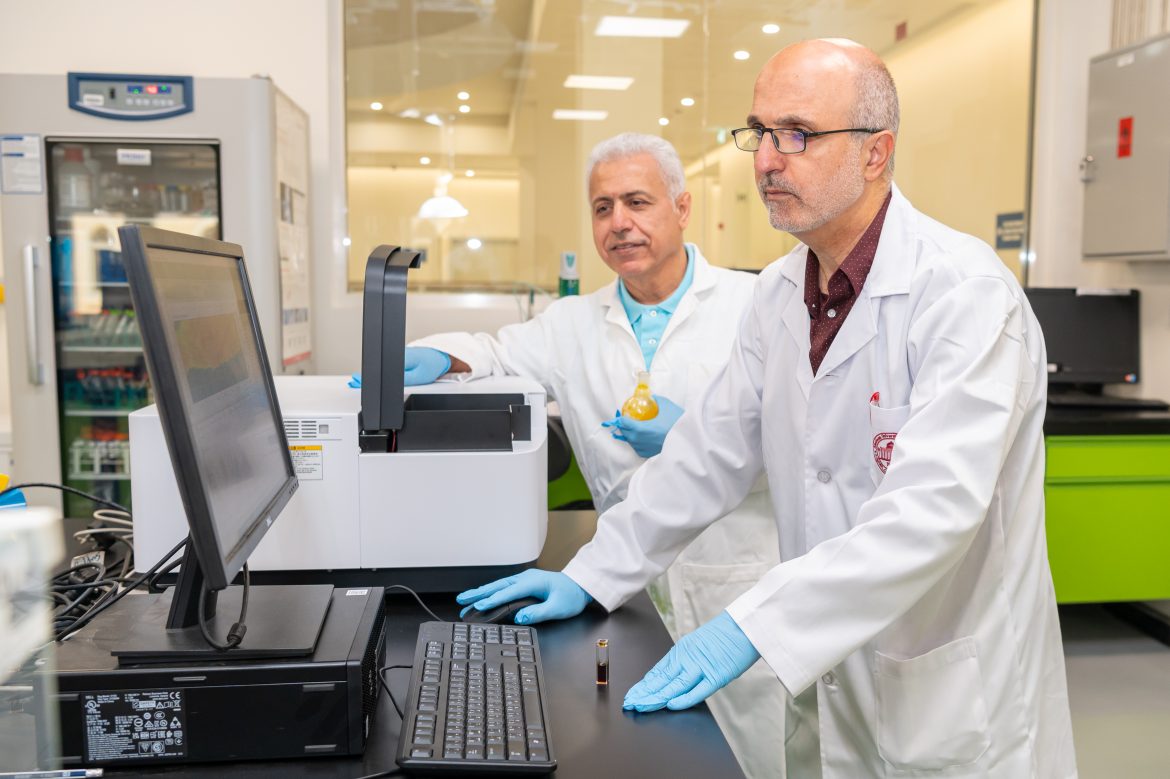Sharjah, UAE, June 24, 2024 – A research team at American University of Sharjah (AUS) has developed two luminescent sensors that can detect minute quantities of toxic compounds containing phosphorus, such as pesticides and Chemical Warfare Agents (CWA), improving upon technology currently available in the market.
The new sensors can be used in several areas, including military and defense for the detection of CWAs, environmental monitoring to detect pesticide contamination in agricultural settings, industrial settings to monitor the presence of toxic chemicals, emergency response to chemical spills or releases, public safety, research and development, and many others.
The AUS Technology Transfer Office has filed for a provisional patent for the technology with the United States Patent and Trademark Office. Funded by an AUS Faculty Research Grant, Dr. Imad Abu-Yousef and Dr. Sofian Kanan, both professors in the Department of Biology, Chemistry and Environmental Science, are now in the process of developing a sensor prototype.
“These sensors are sensitive and selective, which means they can detect even tiny amounts of these compounds. The luminescent sensors change color when they come into contact with these toxic compounds within just 30 seconds. This means they can detect the presence of these compounds in real-time and interact with them, which can also help neutralize some of their toxic effects, making the sensors potentially useful for both detection and protection purposes,” said Dr. Kanan, the project lead.
Unlike other sensors that depend on semiconducting metal oxides such as tin, zinc and others, these luminescent sensors operate at room temperature, eliminating the need for high-temperature conditions and vacuum systems. They are highly sensitive and selective to sarin simulants (chemical compounds that mimic the properties of nerve agent sarin), even in the presence of water and other interfering substances. The sensors are also stable and easy to manufacture in large quantities. These features make them an easier and more efficient method for detecting CWAs.
“This research spanned over 10 months in the research facilities of the Department of Biology, Chemistry and Environmental Sciences. This included the planning of synthesis strategies, characterization of the synthesized sensors, and real testing with a CWA simulant to optimize the sensors’ sensitivity and selectivity. Following the optimization of all conditions and synthetic protocols, the materials can now be prepared within one week in our laboratories,” said Dr. Kanan.
The Department of Biology, Chemistry, and Environmental Sciences at AUS offers robust degree programs dedicated to providing high-quality education and fostering research excellence. With a focus on hands-on learning and cutting-edge research, students and faculty work collaboratively on projects that address real-world challenges. Committed to academic and professional growth, the department prepares graduates for successful careers in science and industry, as well as for advanced studies.
To learn more, visit w.aus.edu/cas/bsc.
About AUS
American University of Sharjah (AUS) was founded in 1997 by His Highness Sheikh Dr. Sultan Bin Muhammad Al Qasimi, Member of the Supreme Council of the United Arab Emirates and Ruler of Sharjah. Sheikh Sultan articulated his vision of a distinctive institution against the backdrop of Islamic history and in the context of the aspirations and needs of contemporary society in the UAE and the Gulf region.
Firmly grounded in principles of meritocracy and with a strong reputation for academic excellence, AUS has come to represent the very best in teaching and research, accredited internationally and recognized by employers the world over for creating graduates equipped with the knowledge, skills and drive to lead in the 21st century.
AUS values learners not driven only by academic success, but by those that embrace our dynamic campus life and embody our ideals of openness, tolerance and respect. This combination of academic excellence and community spirit ensures AUS is filled with world-class faculty and students, poised to become the innovators, thinkers, contributors and leaders of tomorrow.

